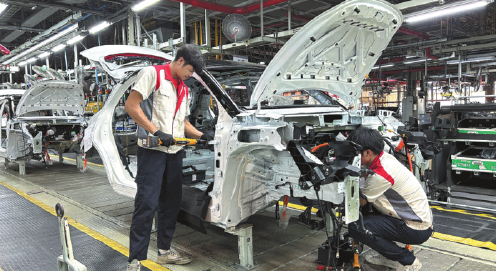Thailand turns EV dream into reality

With the help of Chinese technology and input, Thailand saw its first domestically made pure electric vehicle officially roll off a production base in Rayong on Friday, a milestone in the country's auto history.
The new Ora Good Cat, under Chinese auto brand Great Wall Motor, or GWM, is the EV model with all parts domestically produced. The car was revealed in GWM's factory in Rayong and deliveries are scheduled to commence this month.
Pimphattra Wichaikul, Thai minister of industry, said at the car's launch ceremony that the popularity of battery electric vehicles continues to rise in Thailand amid competition from new electric car brands.
"GWM's Good Cat, in particular, remains highly favored among Thai consumers," she added, noting that the ministry will continuously support and promote the EV industry, collaborating with relevant agencies from both public and private sectors to drive policies and various measures through the National Electric Vehicle Policy Committee.
"This aims to attract investments in the electric vehicle industry and essential components in the country, promote Thailand as a base for EVs and component production in the ASEAN region, and foster sustainable development on a global scale," she said.
As one of the first Chinese auto brands venturing overseas, GWM has initiated its car production in Rayong since 2020, marking the entry of the first Chinese automotive brand to fully start operating in Thailand.
"The new GWM Ora Good Cat is officially rolling off in Thailand, marking a significant breakthrough as the first locally produced pure electric vehicle in the Thai automotive industry in 60 years," said Vudhigorn Suriyachantananont, vice-president of marketing at Great Wall Motor ASEAN.
2030 strategy
Apart from making Thailand GWM's first market to start local production of EVs globally, he said this is also crucial for GWM in supporting the kingdom's EV strategy by 2030 and its accelerated transition to become a regional EV hub.
The Thai government plans for battery EVs to account for 30 percent of total car manufacturing by 2030. This includes the production plan for 725,000 zero-emission cars, 675,000 electric motorcycles and 34,000 electric buses and trucks.
In December, the government approved an extension of the EV promotion campaign, known as EV 3.5 package, to continue supporting both EV manufacturing and adoption until 2027.

Today's Top News
- Crossing a milestone in the journey called Sinology
- China-Russia media forum held in Beijing
- Where mobility will drive China and the West
- HK community strongly supports Lai's conviction
- Japan paying high price for PM's rhetoric
- Japan's move to mislead public firmly opposed






























